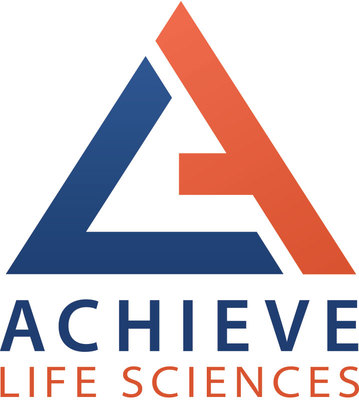Achieve Life Sciences, Inc. (Nasdaq: ACHV), a clinical-stage pharmaceutical company committed to the global development and commercialization for smoking cessation
|
Cytisinicline demonstrated quit rates at least as effective as varenicline Participants on cytisinicline experienced significantly fewer side effects than those on varenicline SEATTLE and VANCOUVER, BC, June 29, 2020 /PRNewswire/ -- Achieve Life Sciences, Inc. (Nasdaq: ACHV), a clinical-stage pharmaceutical company committed to the global development and commercialization of cytisinicline for smoking cessation and nicotine addiction, today announced the successful topline results from the New Zealand RAUORA Phase 3 non-inferiority clinical trial comparing cytisinicline to varenicline (Chantix®) in Māori (indigenous New Zealanders) and whānau (family) of Māori. The study was led by Dr. Natalie Walker, Associate Professor at the University of Auckland, and was funded by the Health Research Council of New Zealand. The RAUORA trial was designed to evaluate the effectiveness, safety, and cost-effectiveness of cytisinicline compared to varenicline as a smoking cessation aid. In total, the study randomized 679 subjects to receive 12 weeks of either cytisinicline or varenicline. The primary endpoint was a comparison of biochemically confirmed continuous abstinence rates at 6 months, and the trial was designed to assess if the two agents were non-inferior to each other. The trial achieved statistical significance in showing that cytisinicline plus behavioral support was at least as effective as varenicline plus behavioral support at six months. In addition, the trial showed that cytisinicline resulted in significantly fewer reported adverse events when compared to varenicline. The final RAUORA trial results have been submitted for presentation at The Society for Research on Nicotine and Tobacco Europe (SRNT-E) Annual Meeting in September 2020. "The positive topline results of the RAUORA Phase 3 trial, which is the first, direct head-to-head comparative study between cytisinicline and varenicline, provide additional evidence that cytisinicline is at least as effective as varenicline while offering improved tolerability," said Rick Stewart, Chairman and Chief Executive Officer of Achieve. "Importantly, these benefits were achieved using a lower dose of cytisinicline. Future cytisinicline clinical trials, sponsored by Achieve, will use a higher dose and optimized dosing schedule, and we believe that this change will allow us to demonstrate even better efficacy than what was seen in the RAUORA trial." "In an effort to achieve New Zealand's Smokefree 2025 goal, smoking rates need to decrease substantially, particularly for Māori and their family, who have the highest prevalence of smoking and the slowest decline in prevalence over the last 20 years," said Dr. Natalie Walker, Associate Professor at the University of Auckland and Principal investigator for the RAUORA trial. "We found that cytisinicline was just as good as Chantix in helping people to quit smoking and stay quit. In addition, we found that fewer people in the cytisinicline group reported any side effects from the medicine compared to those in the Chantix group. These results demonstrated that the study was successful." "We look forward to seeing the publication of full results from this important study which will add to the growing body of clinical evidence supporting cystisinicline's potential as a new tool in the fight against smoking and nicotine addiction. We expect that 2020 will continue to be a pivotal year for our company as we continue to publish new data and expect to initiate our Phase 3 U.S. trial of cytisinicline later this year," added Stewart. About the RAUORA Study In total, 1,105 Māori or whānau (Māori extended family members) expressed interest in participating in the study and a total of 679 were randomized to receive either cytisinicline or varenicline. The average age of participants in the trial was 43 years and approximately 70% of the participants were women. Contact was sought over a period of six to 12 months to collect data and support their quit journey. About Achieve and Cytisinicline Cytisinicline is a plant-based alkaloid with a high binding affinity to the nicotinic acetylcholine receptor. It is believed to aid in smoking cessation by interacting with nicotine receptors in the brain by reducing the severity of nicotine withdrawal symptoms and by reducing the reward and satisfaction associated with smoking. As an approved, branded product in Central and Eastern Europe for more than two decades, it is estimated that over 20 million people have used cytisinicline to help combat nicotine addiction. Forward Looking Statements Media Contact ® Chantix® is a registered trademark of Pfizer Inc.
SOURCE Achieve Life Sciences, Inc. |
||
Company Codes: NASDAQ-SMALL:ACHV |





